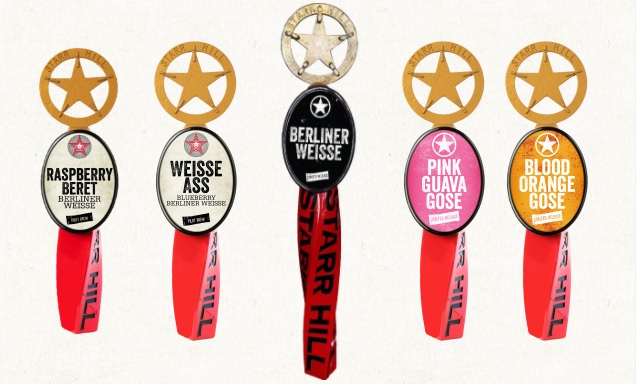Start 14-Day Trial Subscription
*No credit card required

Starr Hill Debuts First-Ever Sour Beers
Starr Hill Brewery in Crozet, Virginia has debuted the first-ever sour beers in the brewery's storied history. Headlined by a Berliner Weisse and two fruited variants, the beers are part of the brewery's All-Access series, which features draft-only limited releases.
The base beer is simply called "Berliner Weisse," and its fruited variants of Raspberry Beret (a Berliner with raspberries) and Weisse Ass (a Berliner with blueberries), are available alongside Berliner Weisse at the brewery's Crozet taproom as well as the Roanoke Pilot Brewery. A few kegs even made it out into the wild, and can be found with the brewery's beer finder.
The full release from Starr Hill is below.
As part of our limited release draft-only All Access series, Starr Hill recently released a Berliner Weisse – its first-ever sour beer.
The American craft beer scene has witnessed a recent boom of German sours, so we asked Brewmaster Robbie O’Cain, trained at the Doemens Academy in Munich, for the inside scoop about this unique style.
What’s the history behind the Berliner Weisse?
While really hip right now in the states, Berliner Weisse is an ancient style of German sour beer; it dates back to the 16th century. Originally from – surprise – Berlin, it’s not really made much outside the city and so it isn’t a mass-produced style.
The reason for its tart flavor was originally due to mixed fermentation, as people didn’t really know what proper yeast management was until the late 1800s. The result is a low-alcohol, tart German-style wheat ale that strikes harmony between yeasts and lactic acid. Berliner Weisse showcases a pale color, nice ester profile and a flavorful finish with low bitterness, allowing the beer’s acidity and cracker-like malt flavors to shine.
How is a Berliner Weisse traditionally served?
In Germany, your Berliner Weisse would be poured into a goblet with a squirt of flavored syrup in the bottom and a stirring spoon. This time-honored ritual is so engrained in the culture that Berliner beers are never really dosed with flavoring prior to serving. Known more for their lager styles like Helles and Märzen, German palates are somewhat less tolerant of tart flavors so the addition of syrup helps to cut the level of pucker.

What was Starr Hill’s approach to the Berliner Weisse?
Brewing sour styles on a big production system like ours is fairly complicated, as the acidity can cause problems for other beers brewed on the same system. All of the dosing in the brewing process for our Berliner Weisse is done in the kettle, rather than further down the line, in order to protect flavor stability of other brands in production.
We’re breaking from the German mold, as we leave our Berliner Weisse tart and dry to increase the refreshing aspects of the beer. Designed to be light on the palate, it’s one of those beers where you want to keep sipping it. I think of it as the beverage version of Skittles, where if I have one then I just keep craving that flavor.
This Berliner Weisse process we’ve developed has encouraged the exploration of historically German sour beers, such as the Gose. We’ve created multiple variations by dosing in fruit purees for endless flavor combinations – including raspberry, blueberry, pink guava, blood orange and more. With the new pilot brewery, we’re able to trial tons of different iterations to see which hold up the best to our brewing standards and to our customers palates!
What are some of your favorite sour beers from other brewers?
Westbrook and Anderson Valley make some of my favorites. Both styles have good tartness and high effervescence, while being super refreshing.
Where can you find Starr Hill’s Berliner Weisse and variants?
For now, this is a draft-only release. First place to check is in the Crozet Tap Roomand Roanoke Pilot Brewery locations! Also look on our Beer Finder to see where Berliner Weisse is on tap in your area.

All Images Courtesy of Starr Hill Brewery



